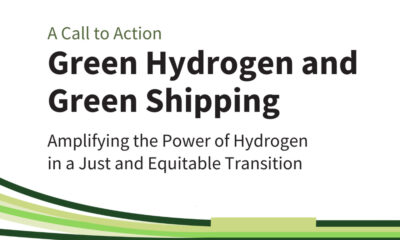LR MDH joins call to accelerate adoption of zero-emission fuels by 2030

At COP 29, global leaders from the shipping industry and beyond have taken a bold step forward in the fight against climate change. More than 50 influential companies and organizations, including Lloyd’s Register Maritime Decarbonisation Hub, have signed a “Call to Action” to support the use of zero-emission shipping fuels. The goal is to increase the share of these green fuels to at least 5% by 2030, with a hope of reaching 10%. This commitment marks a significant push toward reducing greenhouse gas emissions from the shipping industry, which is a major contributor to global pollution.
Strong Support for Green Hydrogen and Zero-Emission Fuels
The Call to Action was organized by respected groups such as RMI (a climate organization), the UN Climate Change High-Level Champions, the UCL Energy Institute, and the United Nations Foundation. By gathering the voices of e-fuel producers, ship owners, cargo companies, and port operators, this Call to Action shows a unified effort to create cleaner fuel options for the shipping industry. Green hydrogen is one of the main fuels promoted, as it has zero emissions when used.
James Forsdyke, Managing Director at Lloyd’s Register Maritime Decarbonisation Hub, spoke about the importance of this commitment: “We’re proud to support the production of green hydrogen for shipping. Building a reliable green hydrogen supply chain will make zero-emission fuels accessible and safe for ships around the world. This shift will not only benefit shipping companies but also seafarers and local port communities.”
The Lloyd’s Register has led important initiatives such as the Silk Alliance green corridor project, which aims to strengthen green fuel networks across regions. These efforts help make green hydrogen and other zero-emission fuels a practical reality for shipping companies.
A Call for Clear Regulations
The maritime industry now awaits an important meeting in April 2025, when the Marine Environment Protection Committee (MEPC) will gather to set new global standards on fuel emissions. This committee will discuss creating a standard for fuel emissions and setting a price for greenhouse gas emissions. The goal is to reach net-zero emissions in shipping by 2050, as outlined in the International Maritime Organization’s Revised 2023 GHG Strategy.
Industry leaders are pushing regulators to set clear rules. This regulatory support is critical for businesses that want to invest in zero-emission fuels confidently.
Key Steps to Speed Up the Use of Zero-Emission Fuels
To achieve this ambitious vision, the Call to Action outlines several key recommendations:
- Set Clear Mid-Term Goals: The signatories request specific and ambitious targets to guide the industry toward using zero-emission fuels.
- Fair Cost Sharing: Transitioning to zero-emission fuels is expensive. The signatories propose a balanced plan to make these fuels cost-competitive with traditional fossil fuels.
- Proven Milestones: The industry needs clear proof that zero-emission fuels are moving toward practical use. Setting milestones will help ensure that hydrogen-derived fuels are a realistic option soon.
Growing Demand for Green Hydrogen
For the shipping industry to help meet the global goal of keeping warming under 1.5°C, green hydrogen production needs to double by 2030. This means at least 5 million tonnes of green hydrogen should be used in shipping by that time. Achieving this will require coordination across the entire supply chain, from green hydrogen producers to port operators and shipping companies. Working together is crucial to make zero-emission fuels like e-ammonia and e-methanol widely available, creating a balanced and fair transition that benefits everyone involved.
Partnerships for a Sustainable Future
The Green Hydrogen Catapult, a global coalition of green hydrogen leaders, is one of the main supporters of this initiative. Oleksiy Tatarenko, who leads RMI’s hydrogen initiatives, emphasized the importance of working together: “To create a fair and quick transition to renewable fuels, we need collaboration throughout the maritime industry. Strong partnerships keep our momentum going.”
Ports and companies that provide port services, along with investors, are also backing this Call to Action. They are committed to building the infrastructure needed to support hydrogen-based fuel. This includes creating safe fueling stations for e-fuels, ensuring that zero-emission fuels are accessible and safe for all ships.
The Path Forward for Shipping
This global Call to Action represents a big step in the effort to cut emissions from the shipping industry. By investing in zero-emission fuels, building partnerships, and encouraging clear regulations, the maritime sector aims to make meaningful progress in reducing its impact on the environment.
As the world looks to a cleaner future, this commitment from global shipping leaders shows that the industry is ready to play a key role in tackling climate change.
